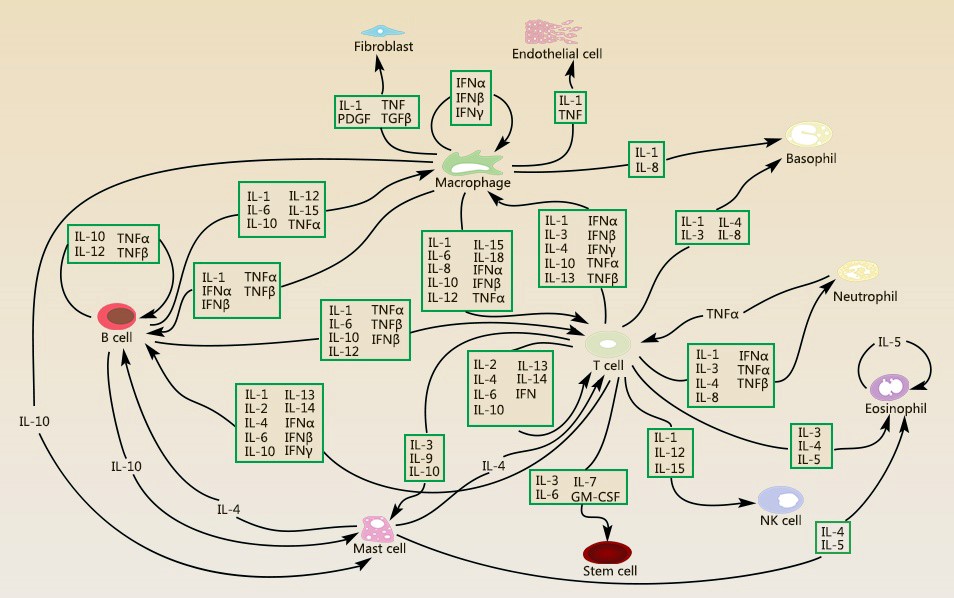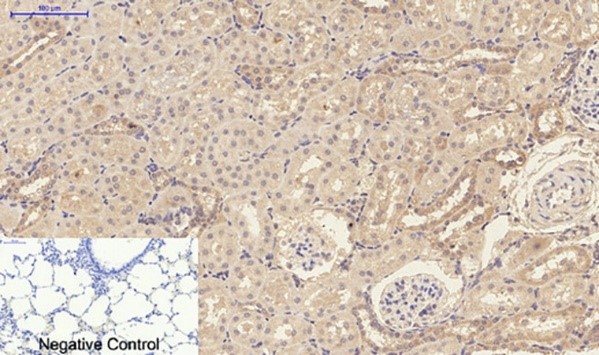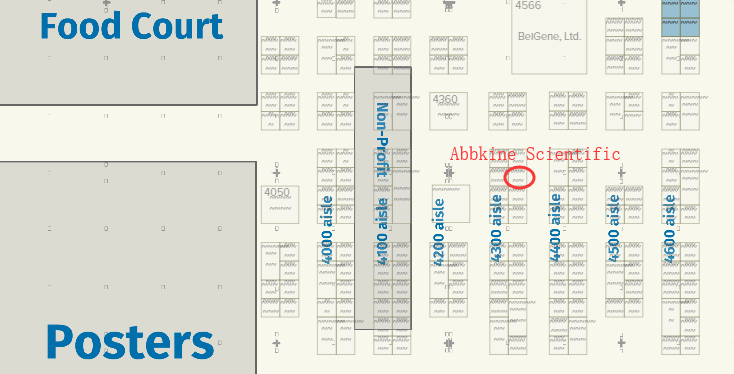| What’s interleukin? What important roles do they play ? |
Interleukins (ILs) are a group of cytokines (secreted proteins and signal molecules) that were first seen to be expressed by white blood cells (leukocytes), The name "interleukin" was chosen in 1979, during the Second International Lymphokine Workshop in Switzerland. An Arabic number is added after the name to distinguish them, such as IL-1, IL-2..., the newly determined factors are named in turn.
Interleukin is a kind of cytokines secreted by macrophages, lymphocytes and other cells. Its main biological functions involve the participation in immune response and immune regulation, constitution of the molecular systems that transmit signals between cells, and so on. Different interleukins have different sources and functions, and some can be produced by different kinds of immune cells. An interleukin can also actin on a variety of cells.
At least 38 interleukins have been found currently, which are named IL-1 ~IL38. They play important roles in the maturation, activation, proliferation and immune regulation of immune cells. In addition, they also participate in a variety of physiological and pathological responses of the body. Deficiency of some rare interleukins can result in autoimmune diseases or immunodeficiency.

| Latest research letters of interleukin may give you new thoughts |
- Scientists from University of Sydney studied the role of IL-17 in its role in diabetic nephropathy. They concluded that absence of IL-17 signalling is protective against streptozotocin-induced diabetic nephropathy, thus implying a pro-inflammatory role of IL-17 in its pathogenesis. Targeting the IL-17 axis may represent a novel therapeutic approach in the treatment of this disorder.
- University of Chinese Academy of Sciences first detected that FBXO38 mediates PD-1 ubiquitination and regulates anti-tumour immunity of T cell. IL-2 therapy rescued Fbxo38 transcription and therefore downregulated PD-1 levels in PD-1+ T cells in mice. Data indicated that FBXO38 regulates PD-1 expression and highlight an alternative method to block the PD-1 pathway.
- Researchers from Albany Medical College elucidated a signaling cascade underlying intestinal fibrosis in which altered mTOR/autophagy in CX3Cr1+ mononuclear phagocytes up-regulates the IL-23/IL-22 axis, leading to an excessive fibrotic response. Thus, our findings suggest that this cascade could be a therapeutic target for alleviation of CD fibrosis.
- Study suggested IL-17RB as a potential early intervening target in H. pylori infection. This study defines a negative regulatory network involving IL-17E, GECs, IL-17RB, CD11b+CD11c− myeloid cells, and Reg3a in the early-phase of H. pylori infection, which results in an impaired host defense within the gastric microenvironment.
- Through the study of short-chain fatty acid pentanoate suppresses autoimmunity by modulating the metabolic-epigenetic crosstalk in lymphocytes, researchers found that by enhancing IL-10 production and suppressing Th17 cells, the SCFA pentanoate might be of therapeutic relevance for inflammatory and autoimmune diseases.
- Study showed that Human IFN-γ immunity to mycobacteria is governed by both IL-12 and IL-23. Human IL-12 and IL-23 are both required for optimal IFN-γ–dependent immunity to mycobacteria, both individually and much more so cooperatively.
| What related products can Abbkine offer ? |
1. Recombinant proteins
Abbkine provides a wide range of recombinant protein products including interleukin, chemokines, interferons, transforming growth factor (TNF), tumor necrosis factor and other cytokines, for the study of cancer, apoptosis, endocrinology, immunology, neuroscience, protease and stem cell research.
The proteins are rigorously tested to meet the research and development demand for excellent quality, uncompromising biological activity at competitive prices, with low endotoxin, and lyophilized powder is available. Part of items are as below.
| Product name | Cat# | Expression | Purity |
| Human IL-4 protein | PRP100273 | E. coli | > 92 % |
| Human IL-1 alpha protein | PRP100048 | Human Cells | > 95 % |
| Mouse IL-17 protein | PRP100491 | E. coli | > 97 % |
| Human IL-6 protein | PRP100120 | E. coli | > 95 % |
| Human IFN-beta protein | PRP100183 | CHO Stable Cells | > 95 % |
2. Crown primary antibodies
Abbkine primary antibodies arget to multiple research areas containing well known signaling pathway, neuroscience, cytoskeleton, cancer, epigenetics, etc. Comprehensive validation, various application, and reliable quality makes Abbkine you first choice. Some interleukin and interleukin receptor associated antibodies are as follows.
| Product name | Cat# | Application |
| IL-1β Polyclonal Antibody | ABP52932 | ELISA, IHC-p, WB |
| IL-1β Polyclonal Antibody | ABP51611 | ELISA, IHC-p, WB |
| IL-6 Polyclonal Antibody | ABP53079 | ELISA, IHC-p, WB |
| IL-8 Polyclonal Antibody | ABP52884 | ELISA, IF, IHC-p, WB |
| IL-20Rα Polyclonal Antibody | ABP51613 | ELISA, IHC-p, WB |

Result example: Immunohistochemical analysis of paraffin-embedded rat lung tissue.IL-1β Polyclonal Antibody was diluted at 1:200 (4°C, overnight).
3. ELISA kits
Abbkine offers a rich portfolio of ELISA kits covering most of research targets (cancer, diabetes, obesity, hormones, food, cytokines, etc.) and multiple species (Human, Mouse, Rat, Dog, Pig, Chicken, Rabbit, Bovine, Canine, Sheep, Fish). Abbkine EliKine™ series of ELISA kits exert high sensibility and specificity, with a comprehensive selection of ELISA kits available for the quantification of cytokines, hormones and other proteins, to meet your multiple experiment demands, with high cost performance and popular with customers. Some indicators are recommended as follows.
| Product name | Cat# | Detection Range |
| EliKine™ Human IL-1β ELISA Kit | KET6013 | 7.8 pg/ml-500 pg/ml |
| EliKine™ Human IL-6 ELISA Kit | KET6017 | 3.125 pg/ml-200 pg/ml |
| EliKine™ Human IL-18 ELISA Kit | KET6023 | 156 pg/mL- 10000 pg/mL |
| EliKine™ Mouse IL-6 ELISA Kit | KET7009 | 7.8 pg/mL-500 pg/mL |
| EliKine™ Rat IL-6 ELISA Kit | KET9004 | 250pg/mL-16000 pg/mL |
About Abbkine Scientific Co., Ltd.
Abbkine serves global scientists in the field of proteomics and cytology and is committed to the innovation and development of various scientific reagents related to proteomics and cytology, expecting to accelerate the pace of life science research and drug discovery. Proteomics products cover the preparation of samples (protein extraction, purification, coupling), protein quantification, antibodies and kits for protein detection. Cytology products involve cytokines (cell culture), cell status detection, cell staining, organelle extraction, cell metabolism and cytopathology reagents (kits). Abbkine relies on the product portfolio and unique marketing support as the main market strategy and product innovation mode, with ultimate aim to facilitate your research career!
